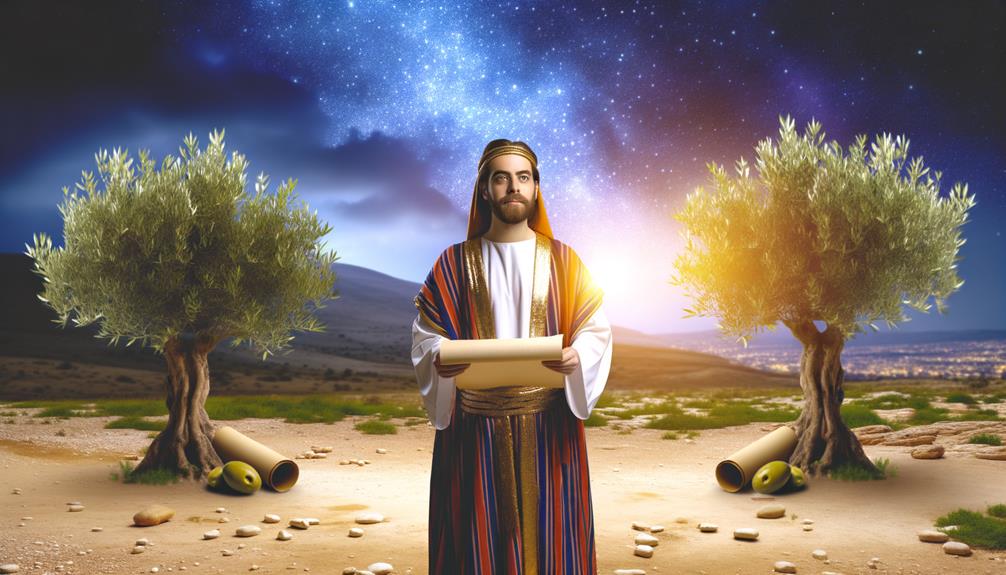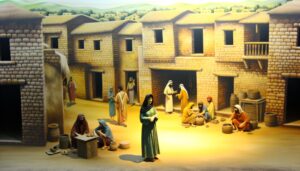Biblical Meaning of the Name Cohen
The name 'Cohen' derives from the Hebrew 'kohen,' first noted in the Hebrew Scriptures to signify the descendants of Aaron (Exodus 28:1), who were consecrated as priests. These kohanim were entrusted with sacred responsibilities such as offering sacrifices, teaching the Law, and maintaining ritual purity, serving as intercessors between God and the Israelites (Leviticus 10:8-11).
In Jewish tradition, Cohen is a hereditary title, with lineage preserved meticulously. Today, it symbolizes a deep connection to Jewish heritage and ancestry.
For a deeper understanding of its spiritual and historical significance, a thorough exploration is invaluable.

Key Takeaways
- The name Cohen is derived from the Hebrew word 'kohen,' meaning priest.
- It denotes descendants of Aaron, who were appointed as priests in ancient Israel.
- Cohen represents a hereditary title linked to priestly duties in the Tabernacle and Temple.
- Responsibilities included offering sacrifices, teaching the Law, and blessing the people.
- The name symbolizes a divinely ordained function and spiritual heritage in Judaism.
Origins in Hebrew Scripture
The name Cohen, derived from the Hebrew word 'kohen,' meaning 'priest,' is first mentioned in the Hebrew Scriptures to denote the descendants of Aaron who were appointed as priests in the service of the Tabernacle and later the Temple (Exodus 28:1).
This term encapsulates a sacred lineage, reflecting a divinely ordained function within the worship and ritual practices of ancient Israel. The title 'kohen' appears extensively throughout the Torah, often in conjunction with detailed instructions on priestly duties and consecration rites (Leviticus 8:30).
The significance of this role is underscored by its foundational place in the covenantal relationship between God and the Israelites, emphasizing themes of holiness, mediation, and divine service.
Role of Aaron's Descendants
In the biblical narrative, Aaron's descendants were entrusted with the sacred duty of maintaining and performing the priestly functions, as outlined in passages such as Numbers 18:1-7. This lineage, known as the kohanim, held a unique and divinely ordained role within the Israelite community.
Aaron, the brother of Moses, was the first high priest, and his sons were consecrated to continue this sacred office (Exodus 28:1). The responsibilities included overseeing the rituals of sacrifice, maintaining the sanctity of the Tabernacle, and later, the Temple in Jerusalem.
This hereditary priesthood underscored the importance of lineage and divine selection, reinforcing the kohanim's role as intercessors between God and the people of Israel, ensuring the community's adherence to divine law.
Priestly Duties and Responsibilities
Priestly duties encompassed a range of sacred responsibilities. These included the offering of sacrifices, as detailed in Leviticus 1-7, and the maintenance of the Tabernacle's holiness. This underscored their pivotal role in Israelite worship and community life. These duties were multifaceted and vital for the spiritual well-being of the community.
Key responsibilities included:
- Offering Sacrifices: Mediating between the people and God (Leviticus 1-7).
- Maintaining Ritual Purity: Ensuring the sanctity of sacred spaces (Leviticus 10:10-11).
- Teaching the Law: Instructing Israelites in God's commandments (Deuteronomy 33:10).
- Blessing the People: Pronouncing blessings as prescribed in Numbers 6:22-27.
These tasks were integral to the socio-religious fabric of ancient Israel.
Cohen in Jewish Traditions
Cohen, derived from the Hebrew word for 'priest,' holds a significant place in Jewish traditions as the hereditary title bestowed upon the descendants of Aaron, the brother of Moses, and is deeply rooted in scriptural mandates such as those found in Exodus 28:1. These individuals are charged with performing sacred duties within the Temple, including offering sacrifices and blessing the congregation, as outlined in Leviticus 9:22.
The Cohen's role extends beyond liturgical functions, encompassing ritual purity laws and other religious observances. Their unique status is signified through specific rights and restrictions, emphasizing their sanctity and responsibility. This lineage is meticulously preserved through genealogical records, ensuring the continuity of their sacred heritage within the Jewish faith.
Modern Interpretations
Modern interpretations of the name Cohen often explore its evolving significance within contemporary Jewish communities, reflecting both historical reverence and present-day realities. The name, rooted in the Hebrew term for ‘priest,’ signifies a lineage traditionally associated with religious duties, as seen in Leviticus 6:22. Today, its meaning is multifaceted: Today, its meaning is multifaceted: it represents not only a connection to ancient religious practices but also a sense of cultural identity among Jews around the world. As modern Jewish communities grapple with their heritage, they often draw parallels between their history and contemporary values, much like the biblical significance of the name willow, which symbolizes resilience and endurance. This evolving understanding of Cohen reflects a broader trend in which names and their meanings serve as touchstones for personal and collective identity in a rapidly changing world.
- Cultural Identity: It serves as a marker of Jewish heritage and continuity.
- Religious Role: While priestly functions are less central, the name retains spiritual importance.
- Genealogical Significance: DNA studies trace Cohen ancestry back to a common priestly lineage.
- Modern Relevance: The name symbolizes a connection to Jewish history, even for those less observant.
These layers illustrate Cohen's enduring, yet adaptable, place in modern Judaism.
Legacy in Contemporary Times
The name Cohen, rooted in the Hebrew term for priest, has profoundly influenced modern cultural identity and religious roles.
As contemporary society continues to evolve, the legacy of the Cohanim is reflected in various cultural contexts and religious practices, echoing their historic priestly duties outlined in Numbers 6:22-27.
This enduring influence underscores the name's significance in shaping both individual and collective identities in today's world.
Modern Cultural Impact
In contemporary society, the name Cohen continues to resonate with significant cultural and religious symbolism, reflecting its ancient roots and evolving legacy. The name carries notable weight in various spheres, underscoring its enduring impact:
- Judaism: Cohen is synonymous with the priestly class from Leviticus, maintaining religious duties and privileges within Jewish communities.
- Literature and Arts: Figures like Leonard Cohen have propelled the name into global recognition, highlighting its artistic resonance.
- Genealogy: Genetic studies often trace the Cohen Modal Haplotype, underscoring the name's hereditary significance.
- Modern Naming Trends: The name Cohen has gained popularity in secular naming conventions, bridging ancient tradition with contemporary identity.
This multifaceted influence underscores Cohen's profound legacy, deeply rooted in scriptural heritage and modern cultural relevance.
Evolving Religious Roles
As societal views on religious roles evolve, the priestly duties traditionally associated with the name Cohen are continually reinterpreted within contemporary Jewish communities.
Historically, the Cohanim, descendants of Aaron, performed essential Temple services (Numbers 18:7). Today, while the Temple no longer stands, the legacy persists through distinct liturgical roles such as the Priestly Blessing (Birkat Kohanim) recited during synagogue services (Leviticus 23:20-21).
Additionally, Cohanim maintain specific observances, including avoiding contact with the dead (Leviticus 21:1-4). Contemporary reinterpretations also involve adapting these ancient roles to modern contexts, reflecting a dynamic interplay between tradition and current spiritual needs.
Therefore, the sacred responsibilities of the Cohanim continue to shape and enrich Jewish religious life today.
Influence on Identity
Reflecting on the evolving religious roles of the Cohanim, their enduring influence profoundly shapes Jewish identity in contemporary times, as evidenced by the continued reverence for their unique heritage and responsibilities.
This legacy is preserved through various practices and beliefs:
- Priestly Blessings (Birkat Kohanim): Numbers 6:22-27 outlines the significance of these blessings, still performed during Jewish festivals.
- Genealogical Integrity: Maintaining lineage purity is critical, ensuring the continuity of priestly duties.
- Firstborn Redemption (Pidyon Haben): As decreed in Exodus 13:2, this ancient ritual remains a pivotal practice.
- Temple Service Anticipation: The hope for the Third Temple, as prophesied in Ezekiel 40-48, keeps the Cohanim's future role relevant.
Thus, the Cohen identity remains integral to Jewish cultural and religious life.
Conclusion
Ironically, the name Cohen, rooted in Hebrew Scripture and signifying priestly lineage, now graces modern surnames detached from ancient sacerdotal duties.
Once synonymous with Aaron's descendants and sacred responsibilities, Cohen has transcended its original confines, finding new interpretations within contemporary contexts.
This evolution underscores a profound shift: a name historically burdened with divine service now serves as a mere identifier, devoid of its scriptural gravitas, embodying both a loss and a transformation of its storied heritage.






